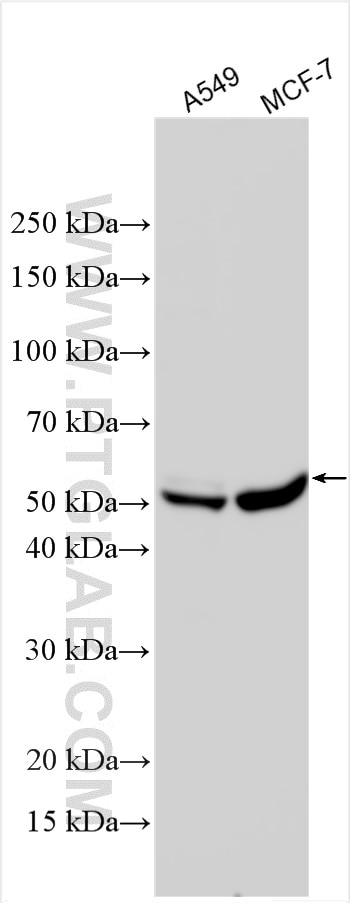Validation Data Gallery
Tested Applications
| Positive WB detected in | A549 cells, MCF-7 cells |
Recommended dilution
| Application | Dilution |
|---|---|
| Western Blot (WB) | WB : 1:1000-1:4000 |
| It is recommended that this reagent should be titrated in each testing system to obtain optimal results. | |
| Sample-dependent, Check data in validation data gallery. | |
Product Information
30713-1-AP targets ADRB3 in WB, ELISA applications and shows reactivity with Human samples.
| Tested Reactivity | Human |
| Host / Isotype | Rabbit / IgG |
| Class | Polyclonal |
| Type | Antibody |
| Immunogen | ADRB3 fusion protein Ag31466 相同性解析による交差性が予測される生物種 |
| Full Name | adrenergic, beta-3-, receptor |
| Calculated molecular weight | 44 kDa |
| Observed molecular weight | 44-50 kDa |
| GenBank accession number | NM_000025 |
| Gene Symbol | ADRB3 |
| Gene ID (NCBI) | 155 |
| RRID | AB_3086396 |
| Conjugate | Unconjugated |
| Form | Liquid |
| Purification Method | Antigen affinity purification |
| UNIPROT ID | P13945 |
| Storage Buffer | PBS with 0.02% sodium azide and 50% glycerol , pH 7.3 |
| Storage Conditions | Store at -20°C. Stable for one year after shipment. Aliquoting is unnecessary for -20oC storage. |
Background Information
Beta-3 adrenergic receptor(ADRB3), a member of the G-protein-coupled receptor family, is expressed mainly in adipose tissue and is thought to contribute to lipolysis and thermogenesis. In addition, the overexpression of ADRB3 has been found in several cancer types, including breast cancer, gallbladder cancer , and colorectal cancer. More recently, the involvement of ADRB3 in the metabolic reprogramming of melanoma, the promotion of immune tolerance, and the regulation of cancer differentiation have been described. (PMID: 32514619)
Protocols
| Product Specific Protocols | |
|---|---|
| WB protocol for ADRB3 antibody 30713-1-AP | Download protocol |
| Standard Protocols | |
|---|---|
| Click here to view our Standard Protocols |
